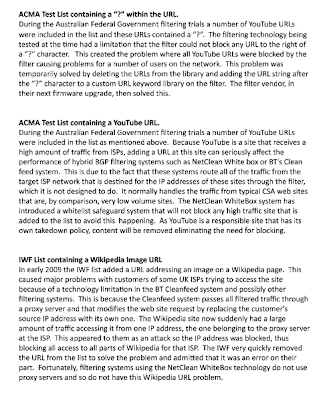Hardly a month goes past without some mention of government-sanctioned censorship occurring somewhere around the world.
On Wednesday 16 September 2009 Politikin in Denmark published an entire book in that day's edition of the newspaper. It did so to make sure that the government of the day (through its defence and treasury departments) did not manage to censor a new book by a former Danish commando.
The same day Senator Stephen Conroy, Minister for Broadband, Communications and the Digital Economy in the Australian Federal Government, was caught out telling fibs about his 'past' intentions for the proposed mandatory national ISP-level Internet filtering scheme when he denied that he had ever considered censoring peer to peer traffic.
This is what the Minister personally said on a DBCDE official blog in December 2008 ( a similar statement was also attributed to him in a News Ltd report on 22 December):
The Government understands that ISP-level filtering is not a 'silver bullet'. We have always viewed ISP-level filtering as one part of a broader government initiative for protecting our children online.
Technology is improving all the time. Technology that filters peer-to-peer and BitTorrent traffic does exist and it is anticipated that the effectiveness of this will be tested in the live pilot trial.
Stephen Conroy
and
This is what the Minster said last Wednesday:
Perhaps Senator Conroy's fearless leader might quietly ask him why he chose to tell untruths to Parliament when he rose to his feet in Senate Question Time on 16 September 2009.
Is it any wonder that the Rudd Government is considered by many to have suspect motives when it comes to its Internet filtering plans?










